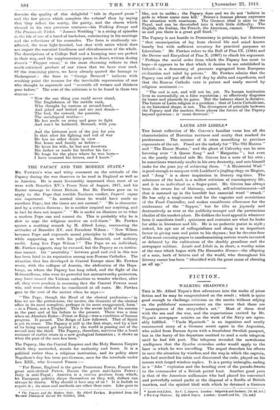LAUDS AND LIBELS.*
THE latest collection of Mr. Graves's familiar verse has all the characteristics of Horatian neatness and sanity that marked its predecessors. The manner of it owes something to previous exponents of the art. Freed set the melody for "The Old Matron" and "The House Master," and the ghost of Calverley can be seen hovering over "A Queue Song" and " Margarine " ; but even on the purely technical side Mr. Graves has a note of his own ; he sometimes wantonly exults in his own dexterity, and sets himself tasks for the pure joy of achieving them. "A Ministerial Wail" is good enough to compare with Lockhart's jingling elegy on Maginn, and " Jong " is a sheer inspiration in literary rag-time. The substance of the book is a mellow criticism of contemporary life, and it is as individual as a finger-print. Mr. Graves has always been the sworn foe of blatancy, conceit, self-advertisement—all that is summed up in the horrible but essential word "swank." He has only a tragi-comic wail for the vagaries and restrictions of the Food Controller, and makes considerate allowance for the exuberance of the "flapper," but he tilts as joyously and destructively as ever at the publicity-monger and the pretentious idealist of the market-place. He dislikes the loud appeal in whatever form it manifests itself ; quietness and restraint are what he looks for alike in literature and life. He is no pedantic purist in style ; indeed, his apt use of colloquialisms and slang is an important factor in giving ease and point to his rhymes ; but he devotes four of his most amusing pages to anathematizing certain words invented or debased by the cultivators of the shoddy grandiose and the newspaper sublime. Laud-s and Libels is, in short, a worthy scion of the race which began with The Hawarden Horace—the offspring of a man, both of letters and of the world, who throughout his literary career has been "identified with the great cause of cheering us all up."


































 Previous page
Previous page